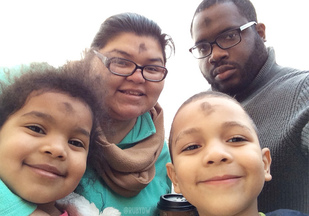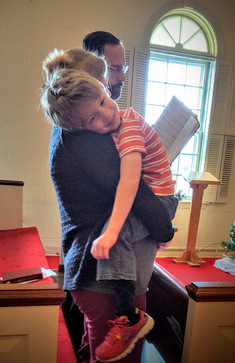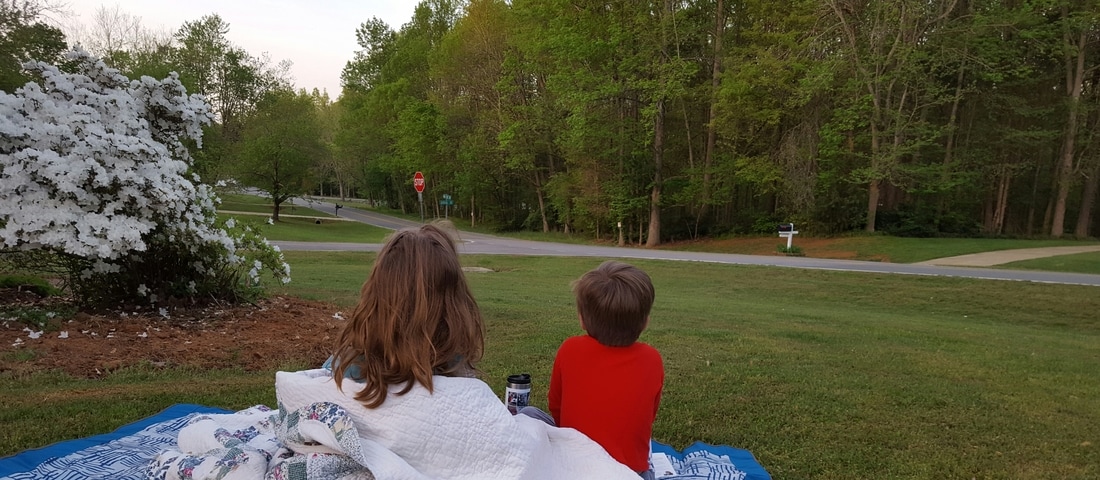|
“Mom! Easter sunrise breakfast!” called my bleary-eyed but excited daughter. Since anticipation is part of the fun, I told her about our new tradition before she went to sleep on Saturday night so she was ready to hold me accountable the next morning. “We’re still doing it, right?”
With two clergy parents serving different churches, Sundays can be a bit hectic for our family. And EASTER Sunday? Well, let’s just say the bunny doesn’t visit our house. He’s too tired. But I want Easter to be special. I want it to be about more than egg hunts and baskets. I want it to be about more than church. I know that sounds strange, but my kids get a LOT of church – and they love it. We love it. We need it. A Christian community that worships, prays, learns and serves together is vital for faith development. But we can’t just read the Bible at church. And my kids need to hear me pray not just at the front of the sanctuary, but at the dinner table and the bedside and even (sometimes) early in the morning, wrapped up in blankets in the front yard. Because the most important faith mentors in the life of a child are not their Sunday School teachers or their youth group leaders or even their pastors. Children learn faith from their families – from their parents and grandparents and all the many beautiful iterations of kinship. Parents, if we want our kids to know God, if we want our kids to love Jesus, if we want our kids to feel the joy of Holy Spirit or learn the holy stories, it’s on us. It’s a big responsibility (even for pastor parents, believe me), and it does require a little thought and effort (even for pastor parents), but it’s not a burden. And it doesn’t have to be hard. God is all around us, and opportunities to weave faith into our daily lives abound. That’s why I love Traci Smith’s new book, “Faithful Families.” She offers simple, powerful practices for all the ordinary and extraordinary moments of family life. From long car rides, interminable rainy days, and mealtime mania to birthdays, new schools, and even times of tragedy and grief, Smith does most of the thinking and a good bit of the work to provide a ceremony, a prayer, a discussion, or an activity to make it holy. Her work is easy to access and adapt to fit the rhythms of different families. If you spend 5 minutes with this book, you’ll find something that makes you say, “we’ve gotta try that!” Easter is a busy day for us, but it doesn’t mean we don’t have time for each other. So we gathered the powdered sugar donuts, mixed the chocolate milk, poured the coffee and set out across the front yard to find the perfect spot to watch the sunrise. “Early in the morning, while it was still dark the women set out for the tomb…” I began the story. “Just like us! It’s early! It’s dark but it’s getting light…” my 4 year old son interrupted. Yes, just like us.
0 Comments
 Ash Wednesday Family Image by RubyDW - used with creative common lisence Ash Wednesday Family Image by RubyDW - used with creative common lisence You are dust, and to dust you shall return. The hand moves with careful deliberation - down, then across - a coal black cross marks each head turning back toward the pews. I move forward in line, my body swaying with the rhythm of the murmured promise, my infant daughter babbling quietly against my shoulder. Finally, I stand before my dear friend and she marks my face with the ashes - last year’s hosannas returned as this year’s dust - the cycle life and death contained their oily grit. Before I turn back to my seat, she looks down at my little girl and I remember I brought her here for a reason. As I shift her tiny face toward this glorious woman, a cry of glee bursts from her baby lips. My friend with the ashy fingers is her friend too, and their faces shine like the sun as they meet in the Wednesday evening darkness. In an instant, this solemn moment when we honor the good and holy truth of death becomes one of life and joy. As it should be. The sign of the cross, the symbolism of the ashes, it all points to life as well as death - but it took a child to show me the truth: God holds our beginnings and our endings. Ashes to ashes, dust to dust. It is powerful to affirm my own mortality, but it is something altogether different to tell my lively daughter that she will die someday. How can we explain the power of these words to children? How do we help them understand the goodness of death without being too macabre? Even now, five years later, as I gaze upon this girl whose being is so full life and joy and glitter and rainbows, who skips and twirls and sings through her days, I cannot imagine a world without her. And yet, that will be. Thank God I have no idea when, or where, or how, but she will die. She - who was created out of star-dust - will return to earth-dust. Her precious body will blow upon the wind and nourish the new life out of the loamy soil, as will we all. In life and in death, you belong to God. This truth breaks my heart, and also makes me whole. Because - more than a truth - these words are a promise. In life and in death, in sunshine and in rain, in baby’s cry and in old age’s sigh, in joy and in tears, my daughter belongs to God. I cannot protect her from death any more than can protect her from life, but I can entrust her to God. You are God’s beloved child, now and forever. These are words of death, but also words of life. They are words of belonging and identity that my daughter needs to hear. Because she will die someday. More than that - she will live through pain and shame and world-shattering disappointment and sole-rending grief. She needs to know that there is never a moment when she is without God’s care. No matter what. Even in the fire, even after the fire when only ashes remain, these too are God’s. And so I entrust her to God, just as I entrust myself to God. And as I speak these words on Wednesday, I will mark the cross in ashes and entrust each precious body I touch to our Creator. God created you from dust, and to dust and to God you shall return. “Potty” is not a word you typically hear in a sanctuary. Potties are for preschoolers and mommies, for sticky fingers and training pants, for lisped emergencies and unseemly accidents. A “potty” does not belong among the pews and polished shoes of our most sacred spaces. But there it was - like nails on the chalkboard of our nice, smooth church service. “Mommy, can I go to the potty?” Every head in the congregation whipped toward my three year old, shifting their focus from the proclamation of the Word to the proclamation of the potty. I wanted to sink into the crimson carpeted floor - or rush her out the side door - but I couldn’t. Because I was in the middle of preaching my first sermon in a new church! With my husband serving another congregation and room full of strangers giggling nervously or rolling their eyes, I continued, determined to preach the gospel - regardless of preschoolers and their bathroom needs. As my daughter skipped down the center aisle, carrying her sparkly little purse and our orderly worship with her, an unfamiliar older woman slipped out of her pew in hot pursuit. And we all breathed a sigh of relief.  Because we are the Body of Christ and sometimes part of the body has to pee, but that does not make her worthless. Sometimes part of the body can no longer climb the stairs to the sanctuary, but that does not make him obsolete. Sometimes parts of the body might need an oxygen mask, or a hearing aid, or crayons, or an extra explanation, but that does not make them a nuisance and it certainly shouldn’t keep them out of worship. Children are a loud and messy part of the body. Their shrieks pierce our holy silence. Their pencils skitter across the floor. Their whispered questions sound more like shouts. Their cracker crumbs infest every crevice within 10 feet of their squirmy little bodies. Kids crunch and cry and crawl up into our holiest of spaces, and God meets them there. God meets us there,”Let the children come to me.”Jesus gathers the little ones into his arms and implores us all to join them in their wonder, their joy, their hopefulness - even their messiness - "for it is to such as these that the kingdom of God belongs" (Mark 10:14). On my first Sunday at this wonderful little church, my daughter distracted us from our order of worship, but she could never distract us from God. When she and her new 80 year old friend marched back up the aisle hand in hand, beaming with holy delight, we all felt the embrace of the Holy Spirit drawing us into community, nestling us into the very heart of God. Our littlest members can make the biggest impact in transforming our church into what God calls us to be - a messy and miraculous body of believers. So the next time a child pulls your focus from the liturgy or the sermon or the prayer, look for God. In the grandfather’s smile, in the mother’s coos, in the sister’s laugh or the friend’s helping hand, God is there, welcoming the little ones - and the big ones too! |
SubscribeDon't miss out on any great content or events!
Categories
All
|
Site by King Communications

 RSS Feed
RSS Feed